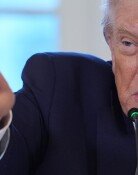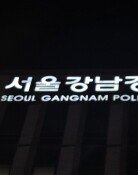National Election Commission Hesitates in Front of President Wall
National Election Commission Hesitates in Front of President Wall
Posted March. 03, 2004 22:26,
It was reported on March 3 that the National Election Commission (NEC) would ask for cooperation or give warning to President Roh Moo-hyun because there is a possibility of misunderstanding President Rohs remark on support for the pro-government Uri Party. Accordingly, controversy over whether President Roh illegally intervenes in the election is expected to grow.
If the NEC actually takes such steps in a general meeting on March 3, it will be the first case that the election watchdog takes a disciplinary action on an incumbent president twice. Late last year, the NEC asked for cooperation from President Roh because he said that two strong camps, the National Grand Party and the Uri Party, should compete in the upcoming general elections in order for the Uri Party to gain advantage. Therefore, all eyes are on whether President Rohs ensuing remarks on the election would be put on the brake.
However, the opposition parties said, The NEC does not regard obvious lawfulness as illegal. That is why it studies President Rohs face. As the opposition parties plan to make clear that they will push for impeachment of President Roh and the chairman of the NEC, rivalry between opposition parties and the Uri Party is expected to deepen.
A point of contention is whether President Rohs remark, which was made during a news conference with broadcasters held on February 24, violates Article 9 and 60 of the election law. He said at a news conference that only if the Uri Party could gain many votes in the upcoming general elections, would he do everything legally. Article 9 of the election law stipulates that civil servants should maintain neutrality in regard to an election. Article 60 stipulates who cannot participate in an election campaign.
There were opinions that because under the election law, the president cannot do election campaigning and the campaign period does not start. President Rohs remark about his support for the Uri Party cannot be seen as violating the election law, said a NEC chief official.
However, there were mixed views whether his remark on February 24 was just an expression of opinion or active election campaigning, he added.
There was a possibility that his remark could violate the election law because President Roh also asked for public support by mentioning a specific election and party. However, many viewed that it was difficult to see his remark as active election campaigning because he made such a remark when answering questions from reporters at the news conference, another NEC official said.
Nevertheless, the election watchdog tries to take such disciplinary action although the action takes on symbolic meaning. NEC officials honestly expressed their thoughts that they could not help considering the situation when the opposition parties showed their will to impeach the chairman of the NEC because the NEC neglected the governments illegal intervention in the election.
In addition, although the opposition parties submitted a written request for an authoritative interpretation on the presidents intervention in the election to the NEC, President Roh said in an interview with a newsweekly, The president is a politician. I can express my view wherever and whoever I support. Why do people make such a big deal? It is said that the presidents remark was also considered by the NEC in deciding disciplinary action. The opposition parties already show a move to backlash against the NECs minimum disciplinary action. Therefore, a political dispute is becoming more intense with regard to impeachment of the NEC chairman as well as an issue of political neutrality of the NEC.
Sung-Won Park swpark@donga.com







